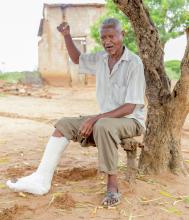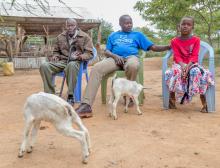Building Health: Kenya’s Move to Universal Health Coverage
One dark night, James Kimeu Mulei had a nasty encounter. The sixty-year old Kenyan man fell victim to a violent attack in which he sustained a broken ankle and was unable to walk.
A few years ago, the story might have ended there: with an elderly man permanently crippled and unable to work. But because James has access to affordable health insurance he is on the road to recovery. After the attack, his son brought him to the hospital, which is easily accessible from his village. His leg was x-rayed, it was put in a cast and he was given medication and an appointment for a follow-up visit three weeks later.
“When I broke my leg, all my tests and drugs were waived. This card has greatly helped me get better health care,” said James.
Today, 12 December is the annual rallying point for the growing movement for universal health coverage (UHC). Africa is making strides towards the goal of ensuring everyone, everywhere, has access to quality health services without financial hardship. Kenya is helping to lead the way.
Just a year ago, President Uhuru Kenyatta identified health as one of the four pillars of his plan for socioeconomic growth, alongside food security, affordable housing and manufacturing. He pledged to make quality health care services available to all households within four years. This is an ambitious target in a country where 80 percent of the population does not have any kind of health insurance.
Since the beginning of 2018, health experts have been working with the World Health Organization (WHO) and other partners to determine a roadmap to UHC which will work for Kenya. In some cases it means working to break customs.
“When people are sick, it is common to organize fundraising meetings to encourage family, relatives and friends to give money to offset the hospital bills. We want to break this…[tradition]…and shield people from out-of-pocket expenditures for their health care,” said Dr Andrew Mulwa, the County Executive Committee member responsible for health.
The criteria that are guiding the choice of coverage model are primarily financial. The model is based on long process of consultation.
“We spent a while consulting, negotiating and discussing in order to see what options…exist and what is most suitable for the country,” said Dr David Kariuki, head of the UHC project. The model chosen is a two-phase medium-term approach which, in the first phase, abolishes all user fees at the primary level (local health care facilities) and the secondary level (county referral) hospitals. The second phase will be the rollout of a social health insurance scheme.
Funding will come primarily from the central government budget, which has set aside US$ 40-45 million for UHC. The government is also considering various other sources of funding, including taxes and/or reallocation of funding from other budget areas. Kenya will also seek funding for certain elements of the health system, such as monitoring and evaluation, from partner organizations.
Kariuki notes, “This funding will help bridge gaps in health systems strengthening, including in the area of human resources for health which will be needed to reach UHC.”
In December 2018, Kenya will launch a pilot UHC scheme in four counties: Kisumu, Isiolo, Machakos and Nyeri. These four counties were chosen because collectively they have a high prevalence of communicable and non-communicable diseases, high population density, high maternal mortality, and high incidence of road traffic injuries. “Once the pilots begin, the next step will be for the national government to work with the remaining 43 counties to decide how to proceed with expanding UHC,” said Dr Kariuki.
One county, Makueni, has already implemented a local UHC scheme where a households pay $US 5 annual fee for access to health care services. The plan has been embraced enthusiastically by residents. As Joel Kioko Wambua, a member of the plan, says, “I am happy that even in old age, I can seek treatment at no cost. I feel valued when I know that I do not have to worry about treatment costs when I go to hospital.”
This county initiative has seen significant results in that 91 percent of residents have enrolled in the local health insurance scheme, compared to only 8.8 percent five years ago. Dr Cyrus Matheka, head of the local health promotion unit, says that implementation of the scheme has also driven a growth in the number of health facilities available to residents – from 22 to 47 – and an increase in the number of health professionals working in the county.
Across the African region, a number of countries have been developing their own approaches to universal health coverage. WHO has been working with countries to assess their current models and develop priorities as well as roadmaps for moving to UHC. Rwanda, for example, stands out in its use of a community-based insurance approach, which has achieved 80 percent coverage. It is anticipated that by March 2019 almost all countries in the African region will have completed at least the initial scoping exercise as part of developing their UHC roadmaps.
Dr Humphrey Karamagi, Sustainable Development Goal Coordinator for WHO AFRO says, “Only when countries ensure equitable access to, and full utilization of, quality health care services, will they be able to meet their health and development goals. We need to accelerate innovative service delivery approaches which can be scaled up for both easy and hard-to-reach populations. This will ensure everyone is getting the services they need everywhere and every time.”
Some of the challenges that countries face in implementing UHC include strengthening health and information systems, human resources for health, finding innovative approaches, and funding. Another concern is that, given limited resources, many countries have, over time, adopted a selective approach which prioritizes certain areas over others. WHO is working with countries to move back to a primary health care model which means addressing all of a person’s health needs, rather than just treating specific diseases.
Communications & Social Mobilisation
Tel: +254 722509403
Cell: +254 710 149489
Email: mwakishaj [at] who.int (mwakishaj[at]who[dot]int)
Communications Manager
WHO Regional Office for Africa
Email: okas [at] who.int (okas[at]who[dot]int)
Tel: +242 06 508 1009




